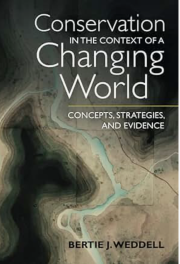Conservation in the Context of a Changing World: Concepts, Strategies and Evidence

Bertie J. Weddell
Cambridge University Press, £49.99
The challenges to reduce natural ecosystem loss and alteration, species loss and extinction have never been greater given past and present human impact on the Earth’s surface and the increasing manifestation of climate change. This book focuses on both these factors in various contexts, as well as the interplay between them, and reflects on the challenges, compromises and confrontations which humanity faces to determine appropriate management practices.
The major sections cover the maintenance of populations of featured species, with a focus on the historical context of resource use, which prompted mapping, description and evaluation of ecosystem resources over time as colonial expansion occurred. This led to the formulation of theoretical concepts such as succession, ecosystem structure, function, and development. Management strategies also emerged to help maximise resource output, to conserve species, habitats and soils, and to resolve conflict between people, pests and harvested plants/animals.
The book later focuses on the restoration of populations, examining central concepts such as species identification and classification, extinction issues and conservation. The protection, management and restoration of species/ecosystems are discussed along with methods for achieving such objectives.
Also examined is the promotion of biocultural diversity and resilience and possibilities of a stewardship approach to conservation. This involves a wide range of factors, including those examined above, but taking account of complex social, ethical and political factors against a backdrop of a changing world politically and climatically.
This is a wide-reaching text. It deserves a wide and varied audience ranging from ecologists to politicians who can promote and play significant roles in land/ecosystem management against a backdrop of climate uncertainty.
Dr A M Mannion
Reviewed by Dr A M Mannion, Honorary Fellow at the University of Reading Department of Geography


